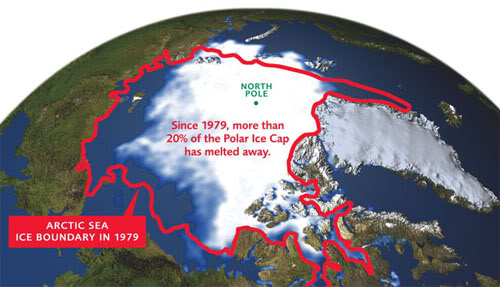Ireland a lifeboat for humanity

Climate change due to man-made global warming will likely bring humanity to the brink of extinction: our survival will depend on climatically temperate islands like Ireland and New Zealand. So says James Lovelock, a respected and life-long scientist whose conclusions on climate change are published in “The Vanishing Face of Gaia: A final warning”. By Malachy Browne.
James Lovelock says that climate change has passed a critical point for humanity and will worsen to the near extinction of humans. Other than the intervention of several powerful volcanic eruptions (or an equivalent geo-engineering solution*), little can be done to sufficiently stem, let alone reverse, climate change before Earth enters what Lovelock terms a “hot epoch”.
Lovelock makes a compelling case. He and a plethora of other scientists say that Polar regions will suffer the greatest climate change, causing a “feedback loop” which will impose greater climate change on the rest of the planet. Receded Polar caps mean that the sun’s energy, of which 80 per cent was previously reflected by ice, is now absorbed by the open water, raising water temperatures and exacerbating global warming.
Warm air holds more water vapour than cold air and scientific data predict “rapid increases in drought” because of this, according to the National Geographic. More floods and deluge are predicted because “what goes up must come down”.
Lovelock concurs. He says that although hot weather brings more rain, “it runs off in floods or evaporates so quickly that it is far less use to food production than in the gentle drizzle that falls on a cool land like Ireland.”
Combine statistics with this analysis, and the outlook is bleak. In the summer melt in 2007, the amount of Arctic sea ice remaining was 22 per cent less than ever before. This equates to over three million square kilometers – an area thirty times larger than England. This melt was 30 years ahead of computer forecasts, and Lovelock in his latest book refers to 2007 as a “milestone”. The following year, the Northwest and Northeast passages opened simultaneously, offering humans the first ever chance ever to circumnavigate the Arctic by water. Scientific research published recently shows that most of the ice in the geographic North Pole will melt next summer; within 20 years the Arctic will be an open sea during summer months.
 Energy demands, human expansion and consumption will continue undeterred. World energy consumption is set to increase by 50 per cent by 2030, according to the US Energy Information Administration. The human population will grow from 6 billion to 9 billion by 2050, bringing even greater burdens, and resulting (ultimately) in human life becoming unsustainable on many parts of the planet.
Energy demands, human expansion and consumption will continue undeterred. World energy consumption is set to increase by 50 per cent by 2030, according to the US Energy Information Administration. The human population will grow from 6 billion to 9 billion by 2050, bringing even greater burdens, and resulting (ultimately) in human life becoming unsustainable on many parts of the planet.
But Lovelock does not despair. His concept of planet Earth is one of a single, self-regulating organism (which he calls "Gaia"), a system that will survive our best attempts at destroying it. And as for humanity, Lovelock says that islands like Japan, Tasmania, New Zealand, the British Isles and smaller island nations will be “the more important exceptions to this planet-wide distress”. Among the least affected by global heating, he says, will be the British Isles and New Zealand, whose “temperate organic position is likely to favour a climate able to sustain abundant agriculture – the lifeboats for humanity”.
The decision for Ireland, Lovelock said in a recent (and excellent) interview with RTE’s Paul Cunningham, will be who to let in and who to turn away.
* The sulphur dioxide produced by volcanoes seems to cool the planet. A scheme to counter global warming by artificially pumping small amounts of sulphur dioxide into the atmosphere is outlined in the book “Superfreakonomics” by Steven Levitt and Stephen Dubner. This could be engineered by hoisting a thin hose into the atmosphere using anchored weather balloons. The solution is pitched as a far cheaper (albeit dangerous) alternative to spending trillions of Euro on existing proposals.
Blasting sulphur dioxide into the atmosphere is an extremely dangerous proposition, not least because sulphur dioxide destroys ozone. Let's face it, the environment has been tampered with enough.
